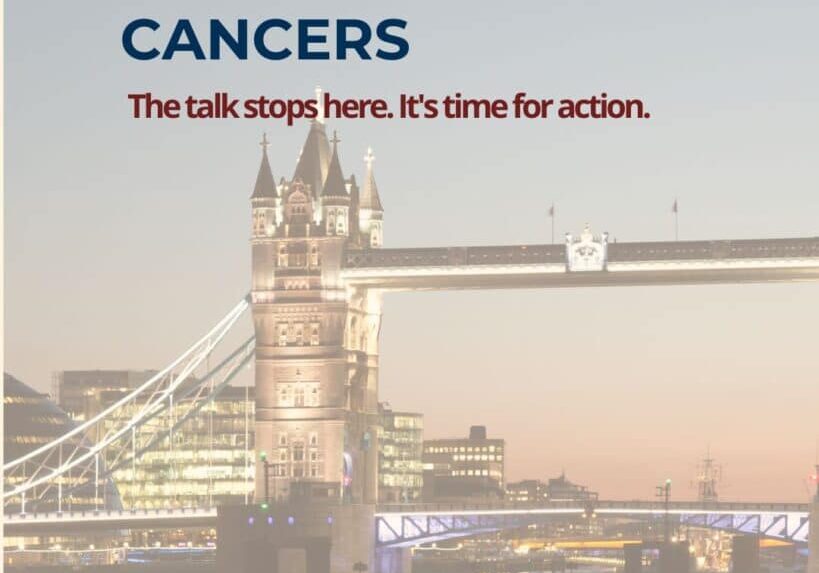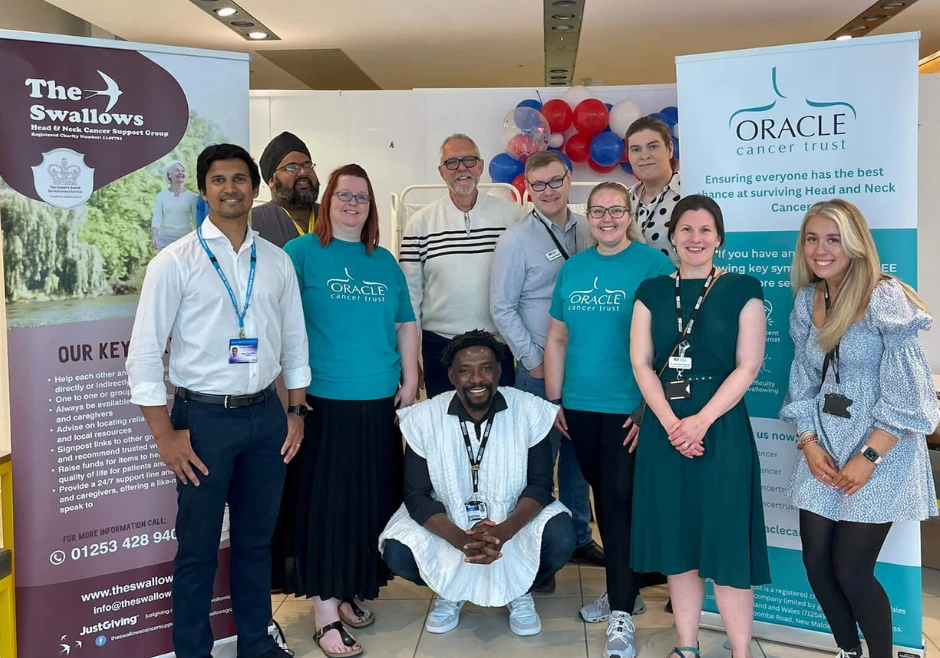Medical experts and researchers team up to highlight increase in head and neck cancer
Experts from the University of Derby, University Hospitals of Derby and Burton (UHDB) and University Hospitals Leicester have joined forces to raise awareness of head and neck cancer. The teams, which included clinicians, nurses and scientists, as well as representatives from two national charities – The Swallows and the Oracle Cancer Trust – are on a mission to highlight the rise in these cancers. As part of their campaign, they offered advice and information and free head and neck screening at a recent event in the Derbion Centre in Derby.
The aim was to help people spot the symptoms of these cancers, which are seeing a sharp rise.
Dr Elizabeth Marsh, Senior Lecturer in Biomedical Sciences at the University of Derby:
“A lot of these cancers are caused by human papillomavirus (HPV), which also causes cervical cancer. It’s good to see the prevalence of cervical cancer falling as a result of successful screening and vaccination programmes, and we need to ensure that there’s the same level of awareness for its ability to cause head and neck cancers.
“Treatment for head and neck cancer, if not caught early, can affect an individual’s ability to eat, breathe, smile and speak, so it’s really important that we make people aware of what to look for.”
Around 80 people were screened at the session, with around 10% referred for further tests.
Mr Bindy Sahota, Consultant Ear Nose and Throat (ENT) and Head and Neck Surgeon at UHDB:
“We believe there is a general lack of understanding and knowledge in the wider public when it comes to oropharyngeal cancers, but they are rising sharply and are now one of the most common forms of head and neck cancer, especially in men.
“The numbers of people smoking are decreasing and there is an increase in awareness of alcohol-related issues, but we are still seeing a large growth in the numbers of cases, driven by HPV.”
Dr Marsh and her team used the day to gauge awareness levels of head and neck cancers. The information gathered will help evidence the need for head and neck screening in the fight against this cancer, which they plan to raise this with health ministers.
Common signs and symptoms of head and neck cancer can include new and fast-growing lumps, persistent issues with your voice, pain when eating, ulcers that don’t heal, and lumps that bleed, but symptoms can vary.
If you are concerned about head and neck cancer symptoms, please speak to your GP as soon as possible.
Follo

Cancer Care: Why Mental Health Support Must Be Part of Every Cancer Journey
Oracle Head & Neck Cancer UK is proud to support the Daily Express Cancer Care campaign, a powerful series that shines a light on the often unseen emotional toll of cancer – and the urgent need for better psychological support for everyone affected. The campaign published over the past three weeks featured voices from across…

Ground-breaking blood test shows promise for early detection of head & neck and other hard-to-screen cancers
A new large-scale trial has found that the blood-based screening test known as Galleri test can detect more than 50 types of cancer – including cancers of the head and neck, which currently have no routine screening programme – and may significantly boost early diagnosis. The trial showed that, when used alongside existing screening methods,…

2 Minutes to Save Your Life: Oracle Launches HeadNeckCheck Campaign for Make Sense Week
This Make Sense Week (15-20 September), the European-wide head and neck cancer awareness initiative, Oracle Head & Neck Cancer UK, is championing both prevention and early detection – recognising that stopping cancer before it starts is just as vital as catching it early. Two Ways to Fight Cancer This Week Prevention Today: Head and neck…

Leadership update
After four successful years as CEO, Tamara Kahn has transformed Oracle into a respected national voice for head and neck cancer patients. She established a national presence, created a four-pillar RACE strategy (Research, Awareness, Collaboration and Patient/Community Engagement) and built strong policy influence. With these foundations now firmly in place, Tamara will transition from her…

Finding Light in Adversity: Seven inspiring stories through head and neck cancer
A new collection of patient stories from Oracle Head and Neck Cancer UK reveals how individuals facing head and neck cancer have discovered unexpected sources of strength, purpose and even joy during their treatment and recovery. The seven contributors share remarkably similar themes despite their unique journeys. Almost all emphasise the power of maintaining a…

NHS to fast-track patients with head and neck cancer into cancer vaccine trial
Patients with advanced head and neck cancers in England will be fast-tracked into a trial of a new cancer vaccine, as the NHS expands its world-leading trial ‘match-making’ service. The investigational cancer vaccine uses mRNA technology to help the immune system recognise and kill cancer cells containing human papillomavirus proteins. More than 100 patients with advanced head…

World Head and Neck Cancer Awareness Day 2025: The HPV Vaccine Could Save Your Life
27th July 2025 This World Head and Neck Cancer Awareness Day, Oracle Head and Neck Cancer UK has a simple but urgent message: HPV vaccination saves lives. With HPV-related head and neck cancers having doubled in the past 20 years, the charity is using today to remind the public that these devastating cancers are preventable…

Data from the National Disease Registration Service on HPV associated and HPV independent oropharyngeal squamous cell carcinoma
The Get Data Out Programme from the National Disease Registration Service (NDRS), part of NHS England, has published statistics on incidence, routes to diagnosis and treatment for patients diagnosed with oropharyngeal cancer in England by human papillomavirus (HPV) status. To our knowledge this is the first time data on oropharyngeal cancer by HPV status has…

Join Us for an Evening of Research, Impact, and Conversation
Research & Impact EveningDate: Monday 28th April 2025Time: 6:00 PM – 8:30 PMVenue: Skyline, Tower Suites, 100 Minories, London EC3N 1JY A Celebration of Research Join us for a meaningful and action-focused evening where we’ll be diving into some of the big conversations around head and neck cancer – especially those linked to HPV (human…

What the Rare Cancers Bill Means for Head & Neck Cancer
14 March marked a crucial moment for research into rare cancers, as the Rare Cancers Bill took another significant step toward becoming law! Dr. Scott Arthur, a Labour MP, introduced this legislation in Parliament to drive much-needed research into cancers affecting fewer than 1 in 2000 people in the UK – including many types of…



